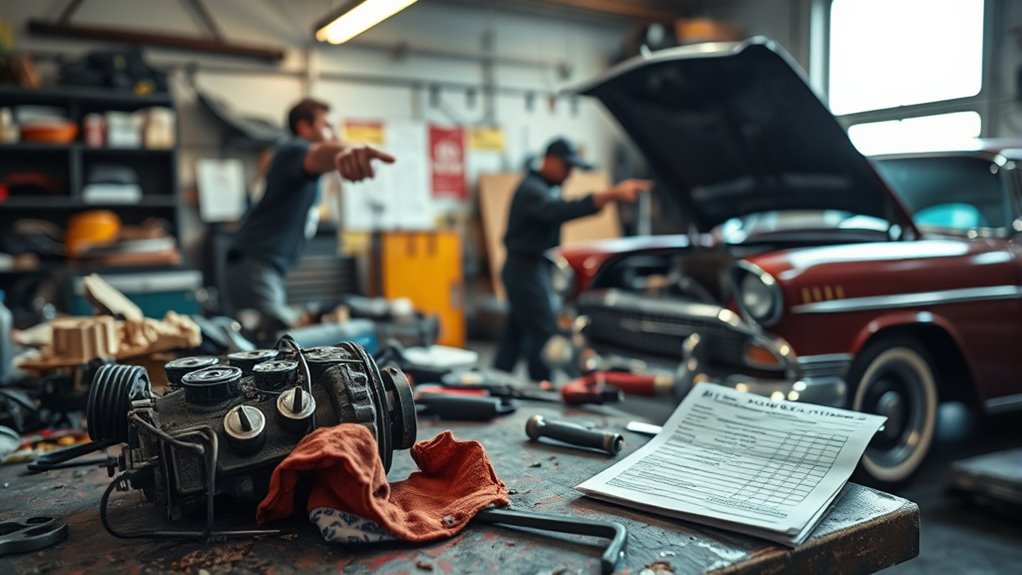Watch out for red flags like sudden, unexplained charges or a mechanic pushing unnecessary repairs. Be wary if they can’t show you damaged parts or give vague explanations. Always get a detailed estimate before work starts and compare prices at different shops. Suspiciously high quotes or reluctance to answer questions can signal trouble. Stay alert to these signs, and you’ll discover more ways to protect yourself from costly car repair scams.
Key Takeaways
- Watch out for significantly higher final bills compared to initial estimates.
- Be cautious if the mechanic avoids showing or explaining damaged parts.
- Beware of vague explanations and reluctance to answer specific repair questions.
- Look out for shops insisting on leaving your vehicle for days without clear communication.
- Always verify credentials, read reviews, and request written estimates to prevent overcharges.

Getting your car repaired can sometimes feel like stepping into a trap, especially when hidden fees and unnecessary repairs inflate the bill. Mechanics might present costs that seem excessive or questionable, leaving you wondering if you’re being taken for a ride. One common red flag is pricing scams, where shops inflate prices or charge for services you didn’t authorize. They might quote a low price upfront but add on charges for parts or labor you never agreed to. Always ask for a detailed estimate before any work begins, and be wary if the final bill is considerably higher than the initial quote. Don’t be afraid to compare prices at different shops; if one quote seems suspiciously high, it’s worth investigating further.
Watch for hidden fees and inflated charges to avoid being overcharged during car repairs.
Another tactic to watch out for involves warranty fraud. Some repair shops might claim that certain repairs are necessary to keep your warranty valid, even when they aren’t. They might push unnecessary repairs or parts replacement under the guise of protecting your warranty, which is a clear red flag. Always review your vehicle’s warranty terms and question any recommended repairs that seem excessive or unnecessary. If a mechanic insists that you need a specific fix to maintain your warranty, ask for written proof or a second opinion. Remember, reputable shops won’t pressure you into costly repairs and will provide transparent reasons for their recommendations.
Beyond pricing scams and warranty fraud, be alert for other warning signs such as vague explanations, reluctance to show you damaged parts, or a shop that insists you leave your vehicle for days without clear communication. Good mechanics will take the time to explain what’s wrong with your car, show you the damaged parts, and give you clear options. If they dodge your questions or try to rush you into making decisions, it’s a sign they might be trying to hide something or take advantage.
Trust your instincts and don’t hesitate to get a second opinion if something feels off. Always request written estimates, verify the shop’s credentials, and check online reviews to gauge their reputation. Being proactive helps you avoid falling victim to these common rip-offs. Remember, you have the right to understand exactly what work is being done and how much it costs. Don’t let shady practices, like pricing scams or warranty fraud, drain your wallet. Staying informed about common financial terms like interest rates and costs can help you make better financial decisions in various situations, including car repairs. Stay informed, ask questions, and choose trusted professionals to keep your vehicle running smoothly without getting ripped off.
Frequently Asked Questions
How Can I Find a Trustworthy Mechanic in My Area?
To find a trustworthy mechanic, start by checking their certification to guarantee they’re qualified. Look for a shop that practices transparency, clearly explaining repairs and costs upfront. Read online reviews and ask for recommendations from friends or family. Visit the shop to observe their professionalism and ask about warranties. Trustworthy mechanics prioritize honesty, so choose one who provides clear communication and demonstrates expertise.
What Are Common Signs of a Mechanic Overcharging?
Imagine your bill as a garden—if it suddenly sprouts unexpected weeds, beware. You might be overcharged if the mechanic charges excessive diagnostic fees or inflates parts markup without explanation. Watch out for estimates that jump wildly or vague explanations. A trustworthy mechanic will be transparent about costs upfront, breaking down charges clearly. Stay vigilant; if something feels off, don’t hesitate to ask questions or seek a second opinion.
Are Online Reviews Reliable for Choosing a Repair Shop?
Online ratings can help you find a repair shop, but you should be cautious. Look for consistent positive reviews, but keep in mind review fraud exists, where some ratings might be fake. Don’t rely solely on online reviews; ask friends for recommendations and visit the shop in person. Combining these strategies guarantees you pick a trustworthy mechanic, reducing your chances of falling for a rip-off.
How Do I Dispute a Suspicious Repair Bill?
Think of your repair bill as a battle of David and Goliath. If it looks suspicious, start by reviewing your warranty claims and checking for billing errors. Contact the shop calmly and ask for an itemized invoice. If needed, escalate the issue with consumer protection agencies or file a dispute through your credit card company. Stay firm, gather evidence, and don’t hesitate to stand your ground for fair treatment.
What Steps Should I Take if I Suspect a Rip-Off?
If you suspect a rip-off, start by reviewing the bill for pricing transparency and compare it with standard rates. Ask for a detailed explanation of the repairs and diagnostic accuracy. Don’t hesitate to get a second opinion from another mechanic to verify the charges. If you still feel uneasy, consider filing a complaint with consumer protection agencies or your local automotive board to address potential misconduct.
Conclusion
Don’t let deception drain your dollars or damage your drive. Stay sharp by spotting shady signs and steering clear of sneaky scams. Remember, vigilance and verification are your best allies against bogus bills and broken trust. By being brave, bright, and bold in your browse for honest help, you’ll keep your car and cash safe. So, stay savvy, stay safe, and steer clear of sneaky, shady service scams!









